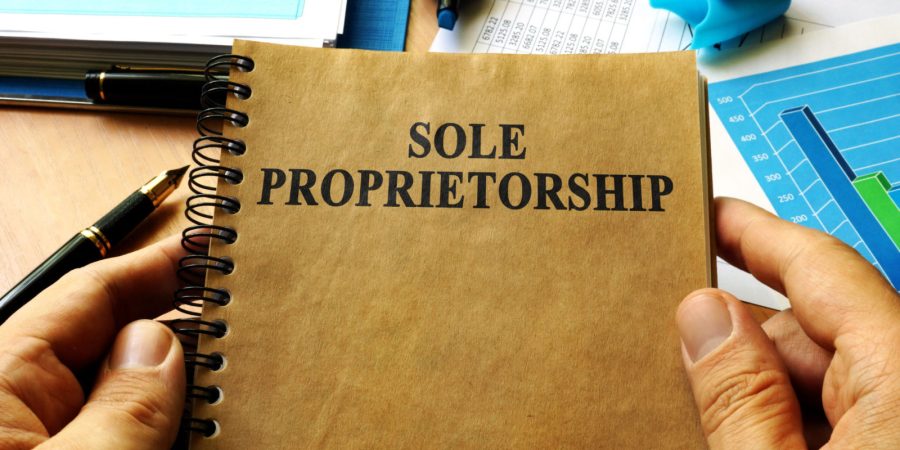Thinking about starting a sole proprietorship in Singapore? Sole proprietor companies are a simple and easy way to get your business off the ground. In this guide, we’ll go through all the steps you need to start your very own sole proprietorship.
The 4 steps to start a sole proprietor business in Singapore are:
- Reserving a name for your sole proprietor company
- Registering an address
- Appoint a local authorized representative, if you’re living outside of Singapore
- Register your business with ACRA
We’ll also answer some common questions, like:
- What is a sole proprietorship?
- Why should I set up a sole proprietorship?
- Who can set up a sole proprietorship?
- What should I do after setting up my sole proprietorship?
- Can foreigners start a sole proprietorship?
- Can I use my home address to register my sole proprietorship?
- What is the tax rate for sole proprietors?
- Can sole proprietors set up subsidiaries?
- Can sole proprietors raise capital for business expansion?
- What compliance obligations do sole proprietors have?
- What are the pros and cons of a sole proprietorship?
- How do I protect my sole proprietor company?
Step 1: Reserving your sole proprietorship name
It costs $15 to reserve your name with ACRA. It’s easy to do via ACRA’s online BizFile+ portal.
Here’s the steps:
- Go to BizFile+ (log in using SingPass. If you’re a foreigner and don’t have one, contact a corporate secretarial company to help you with this).
- Submit your name application
- Pay the fee
- Wait 1-14 days for the name to be approved
Rejection of company names:
If your name gets rejected, you can file an appeal. It will cost you another $15 per appeal.
There are no refunds for rejected names, or rejected appeals. Get it right the first time to save yourself money.
Disallowed company names:
To get your name approved quickly, without hiccups, ensure that your chosen business name is:
- Not already reserved by someone else
- Not identical to, or very similar to existing business names
- Not infringing upon trademarks, copyright, or other intellectual property
- Not prohibited by the Minister of Finance – e.g. “Temasek” is not allowed in business names
- Not vulgar, obscene, sexually explicit, or generally offensive
Also, names that include controlled words like “bank”, “school”, “university”, etc. will take additional time for approval. If you want this done fast, don’t include these words in your application.
Validity of business names:
Once approved, your name is reserved for 120 days (4 months). If you don’t get to step 4 (registering with ACRA) within 120 days, your name will be released and you’ll have to fork out another $15 to reapply.
Step 2: Registering business address
You’ll need to register an official business address in Singapore with ACRA. If you live in Singapore, you could potentially use your home address. HDB has a scheme for HDB dwellers to use their flat as their business address. URA has a scheme for private home dwellers to use their condominium/landed property as their business address. It’s convenient to use your home address, but it’s not great for privacy, because this information will be made publicly available.
A better option is to use a virtual office. Many corporate secretarial firms in Singapore will offer you a virtual office address. This is an official-looking address (frequently in the CBD) that you can use as your business address. Depending on the extent of services offered by your corporate secretary, you can even receive mail, have your mail scanned and emailed to you, and even entertain visitors in-person. Check out our guide on Singapore’s top 5 online corporate secretaries, and learn more about Singapore’s 5 cheapest virtual offices.
Step 3: Appoint an authorized representative (only if you’re not living in Singapore)
If you’re residing outside of Singapore, then you’ll need to appoint an authorised representative who is ordinarily resident in Singapore. This authorized person must be:
- A Singapore citizen, OR
- A Singapore PR, OR
- An Employment Pass/EntrePass holder
The authorized person must also be at least 18 years old.
You must also engage a registered filing agent (e.g. a corporate secretarial firm, or a lawyer) to submit your application on BizFile+.
Step 4: Registering your sole proprietorship with ACRA
Registering your business will cost you $115 (1-year validity), or $175 (3-year validity). If you’re in this for the long-haul, go with the longer registration to enjoy good savings.
To register with ACRA, log on to BizFile+. You’ll need to provide the following documents:
- Approved business name
- Description of business activities
- Registered business address in Singapore
- Home address of sole proprietor owner
- Scanned copy of ID (e.g. NRIC, passport, etc.)
- Statement of Non Disqualification
The online process to register with ACRA takes under 15 minutes generally. The entire process can be done within 1 day, if you have all the necessary documents at hand.
Documents Issued by ACRA
Once ACRA has approved your business registration, they’ll send you an email confirming your new business profile. Congratulations! You’ve officially registered your new sole proprietorship. You can then use your profile to do all the other necessary tasks, like signing up for a bank account.
Step 5: Key things to do after registering sole proprietorship
Open a business bank account
Once you’ve officially registered your sole proprietorship, you should open a bank account for doing business. It’s a good idea to keep your business account separate from your personal bank account.
You can choose from the multitude of local, regional, or global banks located here. DBS, Morgan Stanley, OCBC, etc. are all good brand names to consider. You should note that most banks require the business owner to be physical present in the bank to open the account.
Banks will usually ask for the following documents:
- Completed bank account application form
- Copy of owner’s identification (NRIC, passport, etc.)
- Latest copy of your ACRA profile
- Minimum deposit amount. Will vary depending on the specific account type and bank. Could be as low as $250, and up to $5,000 onwards.
Frequently asked questions on sole proprietorships
What is a sole proprietorship?
A sole proprietorship is the simplest type of business in Singapore. Unlike a Pte. Ltd. business, a sole proprietorship does not offer its owners the protection of limited liability. Sole proprietors have unlimited personal liability for actions performed by their company.
Why should someone set up a sole proprietorship?
Sole proprietorships are good only for business owners who run very small-scale operations. Typically, these are one or two-man shows. They could also be part-time businesses that the owner doesn’t put a lot of time into.
Sole proprietorships are the easiest and cheapest type of corporate entity to set up. It costs $115 to set up a sole proprietorship, compared with $315 for a private limited.
The minimal compliance is another draw for sole proprietors. Private limiteds have to file annual returns with ACRA. Generally, these returns are prepared by an accountant or a corporate secretary, and such services typically cost $300 to $500 for each round of filing. However, sole proprietorships don’t have to file these annual returns. This saves the owner time and money.
Who can set up a sole proprietorship?
To register a sole proprietorship, you have to be either a:
- Singapore-registered company that is not another sole proprietor (e.g. a Pte. Ltd. setting up a sole proprietor subsidiary), OR
- Singapore citizen, Singapore PR, or Employment Pass/EntrePass holder. You must also be at least 18 years old.
- Foreigners can also be sole proprietors. If you’re a foreigner, skip to the next section.
Sole proprietors must appoint at least one company representative who is 18 years or older. This person must be ordinarily resident in Singapore. In most cases, the owner will appoint themselves as the company representative capacity.
Can foreigners set up a sole proprietorship?
Yes, but there are certain steps foreigners must take.
Foreigners residing outside of Singapore:
When registering a sole proprietorship, you must appoint at least one person living in Singapore to be your authorized representative. This person must be a:
- Singapore citizen, OR
- Singapore PR, OR
- Employment Pass/EntrePass holder
You must also engage a registered filing agent (e.g. a corporate secretarial firm, or a lawyer) to submit your application on BizFile+.
Foreigners residing in Singapore:
When registering a sole proprietorship, you must appoint at least one person living in Singapore to be your authorized representative. This person must be a:
- Singapore citizen, OR
- Singapore PR, OR
- Employment Pass/EntrePass holder
You must also engage a registered filing agent (e.g. a corporate secretarial firm) to submit your application on BizFile+.
Can I use my home address to set up my sole proprietor?
Yes you can. There are two home office schemes in Singapore. If you live in HDBs, apply for the HDB Home Office Scheme. If you live in a private property (condo or landed), apply for the URA Home Office Scheme. Both owners and renters are eligible for these schemes.
A local Singapore address needs to be used to as the business address.
What is the tax rate for sole proprietors?
Profits of the sole proprietorship are taxed at the personal income tax rate of the owner. This is because in the eyes of the law, both the sole proprietor entity and the owner are one person. A Pte. Ltd. has a 8.5% corporate tax rate for profits under $300,000 and a 17% tax rate for profits above $300,000. Personal income tax rates start from 0% all the way to 22%.
If you draw a salary as an owner of a sole proprietorship, you will not face double-taxation. If you draw a salary as an owner of a Pte. Ltd., you will face double taxation. Your Pte. Ltd. profits are taxed at the corporate rate, and your salary is taxed at your personal income tax rate.
The key implication for this is that at most income levels, you’ll probably end up paying a higher effective tax rate while running a sole proprietorship. For instance, let’s take a look at an example of two business owners earning the same amount of profit ($320,000/year). Businessman A runs a sole proprietorship, while Businessman B runs a Pte. Ltd.
Sample Comparison of Effective Tax Rates for Sole Proprietorship vs Private Limited | ||
| Sole Proprietorship | Pte. Ltd. | |
| Profit | $320,000/year | $320,000/year |
| Effective tax rate | 13.9% | 9.0% |
| Effective tax amount | $44,450 | $28,900 |
| Difference | +4.9%, or +($15,650) | |
For the owner of the private limited, they can decide to draw their income by declaring dividends. Dividends are not subject to personal income tax. This lowers the effective tax rate of the private limited owner to just 9%. The limitations of this strategy are that the private limited has to be profitable (it’s illegal to declare dividends if the company reports a loss), and the owner has to seek agreement with other shareholders/directors when deciding on the dividend amount. Both these factors may get complicated, depending on your individual circumstances. However, this example does show that if you’re running a profitable company, and have agreeable shareholders, running a sole proprietorship is not as profitable tax-wise compared to a private limited.
Can sole proprietors set up subsidiaries?
A sole proprietorship is not a standalone legal entity. It is part of the legal persona of its owner. Therefore, a sole proprietorship cannot set up a subsidiary.
What compliance obligations do sole proprietors have?
Compliance requirements for sole proprietors is quite light. Here are the key list of requirements (or the lack thereof):
- Sole proprietors need to renew their ACRA registration annually. This is similar to Pte Ltds.
- Sole proprietors do not need to audit their accounts, or file annual returns with ACRA. This is because profits are counted as personal income.
- Sole proprietors should ensure all company letterheads, invoices, etc. carry their UEN number.
- Sole proprietors should update ACRA on changes to business details (e.g. change of address, change of business activity, etc.) within 14 days of the change occurring. Late notifications may result in a penalty, so don’t put this off.
Can sole proprietors raise capital for business expansion?
Equity capital: No. Sole proprietors have only one owner, and cannot take on additional shareholders.
Debt capital: Yes. However, getting a loan for a sole proprietor is usually more difficult than other types of businesses. Banks and other capital providers are typically less keen to extend loans. Even if they do loan you money, they will loan smaller amounts, or impose stricter loan conditions.
It’s generally not as easy to get capital to expand sole proprietorships compared to private limiteds or other business types. Then again, if you’re setting up a sole proprietorship, business expansion probably isn’t on the top of your priorities.
Pros and cons of sole proprietorships
Summary of pros vs cons of sole proprietorships | |
| Pros | Cons |
| Easiest to set up compared to all other types of business entities. | Unlimited personal liability for all actions taken by company |
| Cheapest to set up compared to all other types of business entities. | No corporate tax benefits. For instance, you cannot benefit from tax-loss carry forwards if you declare a loss for a financial year. |
| Complete control of all aspects of business. No Board of Directors to report to. No other shareholders to object. | Cannot take on shareholders. This limits the ability of the business to raise equity capital for expansion. |
| Easiest to strike off business compared to all other types of business entities. | Potentially has higher personal income tax rate than corporate tax rate (17%), depending on profits of the sole proprietor. |
| Least amount of compliance compared to all other types of business entities.
No need to file annual returns. | Business does not carry on in perpetuity. The business and the owner are considered one person (in the eyes of the law), and so the business will cease to exist if you pass away. |
| No double-taxation. Profits are taxed at personal income tax rate, and only taxed once. | Poor for public relations. Sole proprietorships are taken less seriously by customers, suppliers, employees, the public, and other stakeholders in general. May be more difficult to win big accounts, or hire top-tier talent compared to a Pte. Ltd. |
| No need to share profit with other shareholders/investors, as there are none. Owner takes home 100% of after-tax profit. | More difficult to transfer business to another owner. Cannot transfer by shares. Can only transfer by selling business assets. |
Should I set up a sole proprietorship?
A sole proprietorship is good if you’re running a very small business (or part-time business). It’s also good if you want the most minimal amount of fuss, since compliance requirements are the lowest amongst all business types. However, the fact that sole proprietorships attach unlimited liability to the owner should give you some pause. The amount of compliance needed for a private limited is not significantly higher (Singapore is an easy place to do business), and the cost of registering a private limited is also only marginally higher. If you’re intending on building a big business, then a sole proprietorship may be an acceptable choice for you.
Protect your sole proprietor business
Setting up a sole proprietorship is a great achievement. Make sure you protect your business comprehensively. Provide offers business owners the quickest and easiest way to protect their companies.
Click the links below to get your insurance online, in just 3 mins. Premiums are amongst the lowest nationwide.
| Coverage | Explanation | Premium |
| Professional Indemnity Insurance | Covers business-related lawsuits | From $42/month |
| Commercial Property Insurance | Covers property damage from fire, explosions, certain types of water damage, etc.
Covers building structure, renovations, fixtures & fittings, equipment, & more. | From $12/month
|
| Public Liability Insurance | Covers lawsuits related to injuries or property damage to third-parties (e.g. members of the public). | From $9/month |
| Work Injury Compensation Insurance (WICA Insurance) | Covers your employees from work-related injuries/sickness, including Covid-19.
Pays up to $45,000 medical expenses per worker. | From $5/month, per worker |



